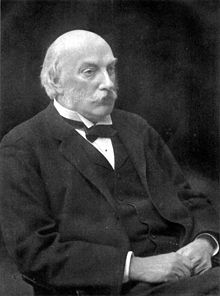John William Strutt 3rd Baron Rayleigh
|
The Lord Rayleigh OM PRS |
|
|---|---|
 |
|
| Born |
12 November 1842 Langford Grove, Maldon, Essex, England |
| Died | 30 June 1919 (aged 76) Terling Place, Witham, Essex, England |
| Nationality | English |
| Alma mater | Trinity College, Cambridge |
| Known for |
|
| Awards |
|
| Scientific career | |
| Fields | Physics |
| Institutions | Trinity College, Cambridge |
| Academic advisors |
Edward John Routh Sir George Stokes |
| Notable students | |
| Signature | |
 |
|
John William Strutt, 3rd Baron Rayleigh, OM, PC, PRS (/ˈreɪli/; 12 November 1842 – 30 June 1919) was a physicist who, with William Ramsay, discovered argon, an achievement for which he earned the Nobel Prize for Physics in 1904. He also discovered the phenomenon now called Rayleigh scattering, which can be used to explain why the sky is blue, and predicted the existence of the surface waves now known as Rayleigh waves. Rayleigh's textbook, The Theory of Sound, is still referred to by acoustic engineers today.
Strutt was born on 12 November 1842 at Langford Grove in Maldon, Essex. In his early years he suffered from frailty and poor health. He attended Harrow School, before going on to the University of Cambridge in 1861 where he studied mathematics at Trinity College, Cambridge. He obtained a Bachelor of Arts degree (Senior Wrangler and 1st Smith's prize) in 1865, and a Master of Arts in 1868. He was subsequently elected to a Fellowship of Trinity. He held the post until his marriage to Evelyn Balfour, daughter of James Maitland Balfour, in 1871. He had three sons with her. In 1873, on the death of his father, John Strutt, 2nd Baron Rayleigh, he inherited the Barony of Rayleigh.
...
Wikipedia
